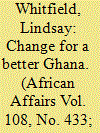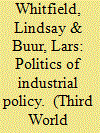|
|
|
Sort Order |
|
|
|
Items / Page
|
|
|
|
|
|
|
| Srl | Item |
| 1 |
ID:
092988


|
|
|
|
|
| Publication |
2009.
|
| Summary/Abstract |
This article analyses the process and outcomes of Ghana's 2008 elections, which saw the National Democratic Congress replace the New Patriotic Party and thus an alternation of ruling party for the second time since (re)democratization in the early 1990s. It argues that Ghana's democratic political system survived the closeness and intensity of the 2008 elections because it has developed stabilizing characteristics: an independent Electoral Commission and transparent electoral processes, integration of the political elite alongside the creation of norms and institutions structuring elite behaviour, and the institutionalization of political parties. The closely competitive elections are the result of a two-party system where voters and political elites are mobilized around two political traditions. These political traditions provide ideological images, founding mythologies and political styles for the parties. Thus, Ghana is different from several African countries where parties split or form around leaders, who bring their popular support base with them. It is also different in that elections are not dominated by ethnic politicization, because the two main parties in Ghana have a strong political support base in most regions and party identification is based on cross-cutting social cleavages of which ethnicity forms only one part.
|
|
|
|
|
|
|
|
|
|
|
|
|
|
|
|
| 2 |
ID:
099814


|
|
|
|
|
| Publication |
2010.
|
| Summary/Abstract |
This article presents a new analytical approach to the study of aid negotiations. Building on existing approaches but trying to overcome their limitations, it argues that factors outside of individual negotiations (or the `game' in game-theoretic approaches) significantly affect the preferences of actors, the negotiating strategies they fashion, and the success of those strategies. This approach was employed to examine and compare the experiences of eight countries: Botswana, Ethiopia, Ghana, Mali, Mozambique, Rwanda, Tanzania and Zambia. The article presents findings from these country studies which investigated the strategies these states have adopted in talks with aid donors, the sources of leverage they have been able to bring to bear in negotiations, and the differing degrees of control that they have been able to exercise over the policies agreed in negotiations and those implemented after agreements have been signed. It argues that Botswana, Ethiopia and Rwanda have been more successful than the other five cases in levering negotiating capital from the economic, political, ideological and institutional conditions under which negotiations occur.
|
|
|
|
|
|
|
|
|
|
|
|
|
|
|
|
| 3 |
ID:
128466


|
|
|
|
|
| Publication |
2014.
|
| Summary/Abstract |
Economic transformation is driven by successfully implemented industrial policy, but industrial policy is inherently political. We cannot understand why some governments pursue and implement industrial policy better than others without understanding its politics. This article addresses the conditions under which industrial policies are successfully implemented. It presents an analytical approach to understanding why some ruling elite-capitalist alliances lead to better economic outcomes than others. Sub-Saharan African countries present a particular puzzle, given their low productive capabilities and the relatively small number of successful productive sectors. The article examines the most successful productive sectors in Mozambique and in Ghana in order to illuminate the conditions under which such alliances occur and their specific characteristics and outcomes.
|
|
|
|
|
|
|
|
|
|
|
|
|
|
|
|
| 4 |
ID:
098754


|
|
|
|
|
| Publication |
2010.
|
| Summary/Abstract |
This article describes and explains the impact of the donor-driven Poverty Reduction Strategy Paper (PRSP) and the aid modalities surrounding it in Ghana. It focuses on the period in which the New Patriotic Party (NPP) government was in power from 2001 until 2008, but places this within the broader context of aid dependence in Ghana since the 1980s. It is argued that the PRSP documents produced by the government had little impact on implementing policy actions, but rather their function was to secure debt relief and the continuation of foreign aid from official donors. The article examines what was actually implemented during the NPP government and the factors that influenced those actions. More generally it highlights the constraints Ghanaian governments have faced in pursuing economic transformation within contemporary domestic and international contexts.
|
|
|
|
|
|
|
|
|
|
|
|
|
|
|
|
|
|
|
|
|